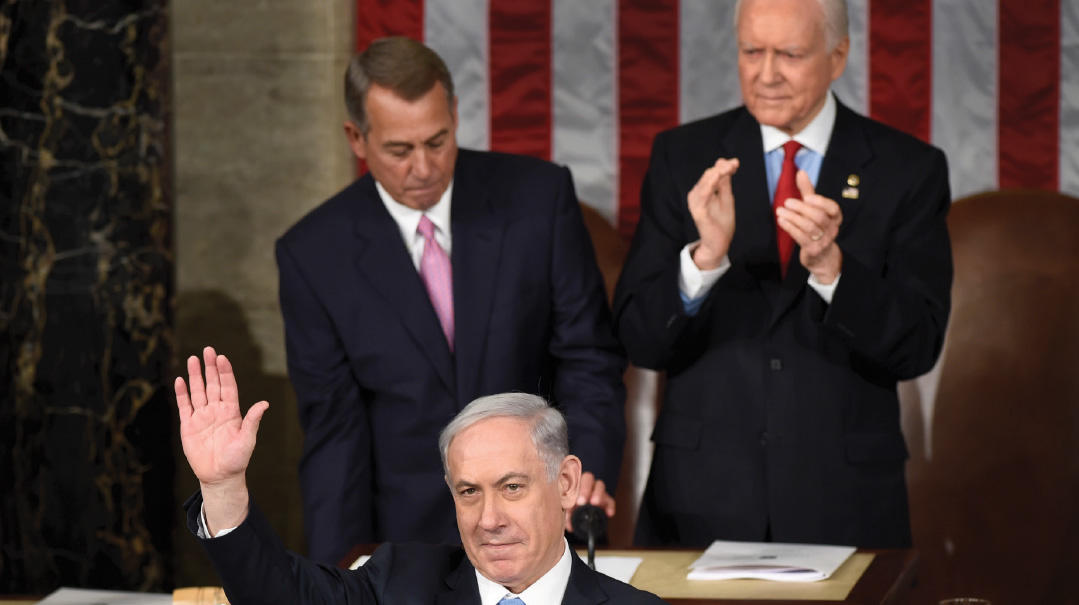A Bleak Report Card

Only those privy to all the facts can determine what price Israel can afford to pay for the return of the hostages

1
At least 11 ministers and 15 Knesset members have a concrete plan for “the day after.” As yet another Israeli surrender deal took shape in Paris, right-wing ministers and MKs gathered at a conference in Jerusalem to demand the renewal of the Jewish settlement in Gaza and the rebuilding of Gush Katif, the settlement bloc evacuated as part of the disengagement in 2005.
The conference on Sunday last week ended with jubilant dancing to the tune of “Hoshia es Amecha,” but sometimes it seems that the first thing the Jewish People need yeshuah from is the government’s own policy.
Like the father reprimanding his son for pointing out his A in Choir amid an otherwise bleak report card (“With such grades, how can you sing?”), the Israel public was irritated by the festive atmosphere at the conference.
Netanyahu himself was quick to disavow the vision of resettlement in Gaza, clarifying that his position hasn’t changed. But I was told separately by two ministers who participated in the conference, Housing Minister Yitzhak Goldknopf of UTJ and Diaspora Minister Amichai Chikli of the Likud, that Netanyahu hadn’t said a word to them about it. This double game serves Netanyahu vis-à-vis the Americans, allowing him to portray himself as having his hands full resisting the right’s pressure for renewing the Jewish settlement in Gaza, just as he did with the right-wing protests blocking the entrance of humanitarian aid to the Gaza Strip.
Just this week, Bibi demanded that National Security Minister Itamar Ben Gvir deal with right-wing protesters blocking trucks bearing humanitarian aid to Gaza at the Kerem Shalom Crossing. Ben Gvir refused, arguing that as a member of the political echelon, it would be inappropriate for him to intervene with officers’ decisions on the ground. The law-abiding police minister reminded Netanyahu that during the judicial reform, the attorney general prevented him from personally intervening in clearing roads of left-wing demonstrators.
After the Southern Police District refused to employ violence to disperse the protests, Defense Minister Gallant was forced to declare the site a closed military zone and use the military to clear the area. Netanyahu was able to spin the American administration another yarn of a moderate prime minister whose hands are tied by rogue ministers.
2
The Americans aren’t the only ones frustrated by the Israeli government’s lack of a plan for the day after. In an appearance before the war cabinet last week, senior IDF officials expressed concern that the vacuum in areas of the Gaza Strip where the IDF is no longer active is allowing Hamas to regain effective governing control of swaths of northern and central Gaza.
Some 200,000 civilians remain in the northern Gaza Strip, and in practice, with the IDF pulling back from some areas, they’re once again governed by Hamas operatives in civilian clothes. The only right-wing minister with a concrete plan of action is Finance Minister Bezalel Smotrich, who proposes bringing Gaza under the jurisdiction of the Civil Administration, which would put the IDF in charge of all aspects of civilian life.
The Americans, on the other hand, see the tragedy of October 7 as an opportunity for a regional reset. President Biden came to Israel’s aid on October 8, and now the administration wants payback in the form of a Palestinian state and a broad regional peace agreement.
Netanyahu is keeping his cards close to his chest, and some in National Unity are calling him “Bibi No No,” an allusion to a stuffed bear from a popular Israeli children’s book who can only say no.
“If we get the impression that Bibi is deliberately torpedoing a deal to release the hostages, we won’t remain in the government,” a source in the National Unity party told me this week, adding that Bibi is deliberately procrastinating.
According to the source, Bibi believes that the operation in the Gaza Strip will continue beyond the critical date of November 5, 2024, and therefore prefers to push off a decision. “After all, the IDF will have to remain in the Gaza Strip through 2024 anyway, and negotiating about ‘the day after’ with a Democratic administration on the eve of elections is the worst possible timing. His internal memo is a deliberate evasion along the lines of: ‘First we have to win. Once Hamas is defeated, we’ll think about the future alongside whatever administration is in power at that time.’ ”
At one war cabinet meeting, Netanyahu compared the current ruins in the Gaza Strip to the ruins of Berlin in 1945. “Just as it was clear to the Allied powers during World War II that absolute victory had to be achieved before there could be talk of rebuilding Germany the day after, we can’t meaningfully discuss the day after in Gaza until we’ve achieved an absolute victory over today’s Nazis.”
3
After a decade and a half of Netanyahu as prime minister, the ritual is well-worn. Israel is never the first to announce the terms of the deal ending each round with Hamas. The first reports of a breakthrough always come from Egyptian or Qatari sources, and are met by an initial silence from Israel that invariably turns out to imply tacit agreement.
Israel’s reluctance to acknowledge the terms of cease-fire deals doesn’t stem from the Israeli military censor, but from pure shame. After all the high talk about toppling, crushing, deterring, surprising Hamas and/or Iran and/or Hezbollah, Israel’s political leadership never has the courage to acknowledge to the public it’s striking a deal from a position of weakness.
After October 7, one might have expected that at least one lesson would be learned, and that instead of scattering bold declarations, Israel’s leadership would finally hold an honest dialogue with the public. If Netanyahu were to convene a special press conference to explain to the Israeli public that his government is at this moment conducting negotiations for a stomach-churning deal that would see thousands of terrorists released and a significant reduction of the war, everything would look different.
But as a source at the Hostages and Missing Persons Families Forum told me this week after another meeting with Netanyahu: “Bibi seems to be afraid of implementing the deal to avoid paying a price within the right-wing coalition, but is doing everything in his power to avoid the blame.”
Only those privy to all the facts can determine what price Israel can afford to pay for the return of the hostages, but one thing is very clear: The internal discourse in Israel has reverted to the pre-Simchas Torah 5784 tone, and the only actor benefiting from this is Yahya Sinwar.
(Originally featured in Mishpacha, Issue 998)
Oops! We could not locate your form.







